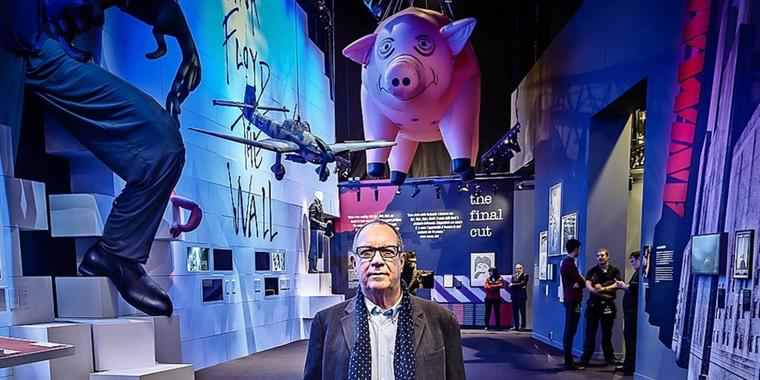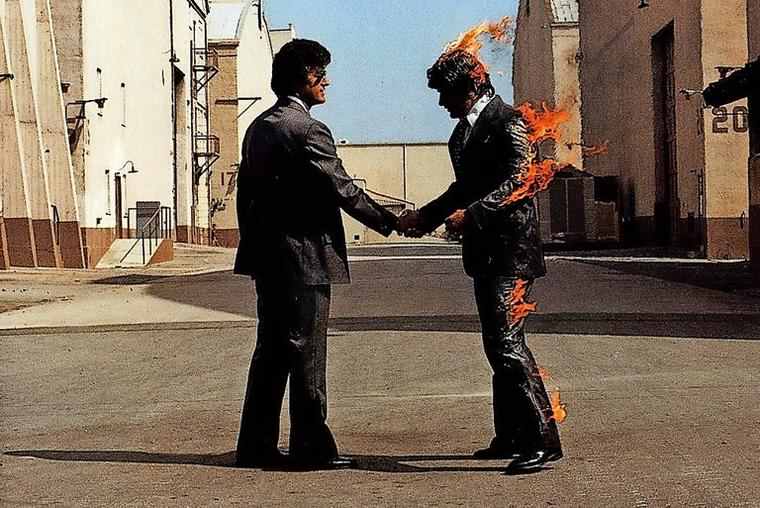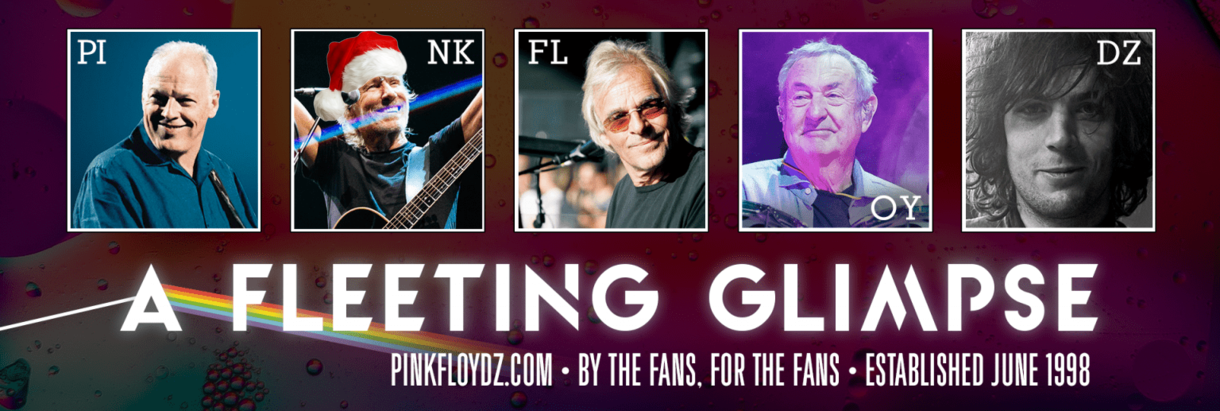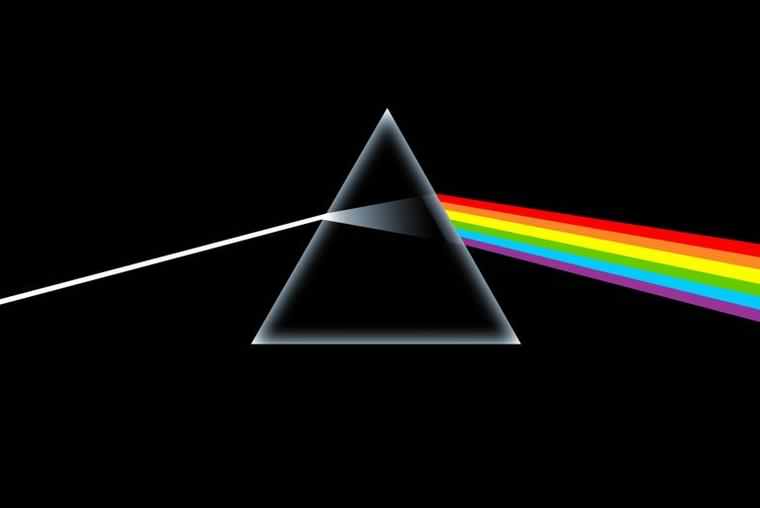Aubrey Powell : Hero of the Vinyl Era
Aubrey Powell is a hero of the vinyl era. The record covers, designed by the British photographer and his artistic partner Storm Thorgerson for Pink Floyd and other rock stars, are world famous. Still, he says, he hugged the digital world tight. For a reason.

“Pink Floyd loved our ideas”: Aubrey Powell, shot in the Pink Floyd exhibition “Their Mortal Remains”, which he put together.
They worked for the biggest rock stars of the seventies, including for Led Zeppelin , Paul McCartney , Peter Gabriel and The Who. Most famous is the cover of the Pink Floyd album “The Dark Side of the Moon”. Is this your favorite motif?
The cover is so well known because the album has sold 65 million copies. If it had been sold only a thousand times, it might not be that iconic. It’s not my favorite cover because it’s a graphic. I like best photographic covers, like the 1971 “The Nice” album “Elegy”. I photographed red balls in the Sahara . When I made the design The Nice keyboardist Keith Emerson showed he said, “That looks expensive.” I replied, “Yes, the record company will never pay that.” And he: “Okay. Then I’ll do it. “It was the first time anyone really believed in Hipgnosis.
Her trademark was strange, weird motives like the cow on the Pink Floyd album “Atom Heart Mother”. Where did you get your ideas from? Who inspired you?
Surrealist artists like René Magritte , Salvador Dalí , Giorgio de Chirico and Marcel Duchamp had Storm and me heavily influenced. Our cover illustrated neither the music nor the lyrics, they also had no relation to the band name or the album title. It was just plain, well thought-out pictures. They should stand for otherness and stand out in the record stores with their millions of albums. Pink Floyd loved that.
Who would you like to work for?
Bob Dylan and Bruce Springsteen , because both tell stories with their songs. Our covers also told stories.
Would you like to work for rappers or R’n’B artists today?
Yes, because I find many of their covers uninteresting. Mostly they are photographs of the musicians themselves, as was customary in the fifties. Beyoncé, Rihanna , Drake or Jay-Z do not care so much about cover design. The reason is that packaging is no longer important, because fewer and fewer people buy physical recordings, but stream or download their music. Their stage shows, on the other hand, are very artistic and elaborate.
The photographer Aubrey Powell (72) has with his partner Storm Thorgerson designed hundreds of album covers for the rock stars of the sixties, seventies and eighties. Best known is the shell of the Pink Floyd album "The Dark Side of the Moon". The psychedelic rock band was one of the main clients of their design company Hipgnosis. In addition, the two worked for, among others Paul McCartney , Led Zeppelin , Genesis, Yes and Peter Gabriel . Later, Powell shot music videos for the same artists. Most recently, the 72-year-old Briton curated the exhibition, which is still running until 10 February 2019 in the Dortmunder U "The Pink Floyd Exhibition - Their Mortal Remains ". Powell is still friends with all of the still-living Pink Floyd members.
The cover design has already lost importance: at the beginning of the eighties, when the CD and music videos came out. At that time also the history of Hipgnosis ended. Were you sad then?
Not at all. I was relieved. I wore a Hasselblad camera in front of my chest for 15 years, working everyday, all over the world. We had the heyday of the album cover, which in 1967 with “Sgt. Pepper’s “Lonely Hearts Club Band” began and ended in 1982, not only experienced, but shaped. We wanted to make films now. By coincidence, MTV started, and we saw our chance to leave the album art world. In addition: The record companies were no longer willing to spend so much money on a cover because of the punk movement. They had realized that you could have a cover for 2 pounds. In addition, the CD was introduced. Who wants to work for such a tiny format? Not me.
They say punk destroyed the budget. Curiously, they moved Sex Pistols in the same building in the Denmark Street, which included the Hipgnosis headquarters. Did you hate the band?
The Sex Pistols had their practice room there. We used the same entrance. Sometimes we heard them rehearsing. It sounded completely useless to me. We were used to working with very demanding musicians. One day I met Johnny Rotten in the hallway. He wore his famous “I hate Pink Floyd “shirt. “Why are you wearing this?” I asked him. “You are old men, you hear Crosby, Stills and Nash all day, you are finished. We are the New Wave. Watch out! “He answered. He was very aggressive. But I realized that there was a change in the air.
Could not you win punk?
Malcolm McLaren , the Sex Pistol Manager, invited me to the first concert. It should take place right across the street. “I’m not dreaming to watch a Sex Pistols gig. They are horrible, “I replied and turned down the invitation. I regret this decision until today.
Do you still listen to vinyl as a cover artist today?
I owned thousands of LPs. I sold them all. Vinyl is too complicated. I have a jukebox with singles from the sixties and seventies. Otherwise, I download my music. I hugged the digital world.
How could that happen?
Our productions were very time-consuming at that time and lasted up to six weeks. We worked without special effects. What can be seen in the pictures, there was also in reality. That was our way of working. We wanted it that way. For the cover of Pink Floyd’s album “Wish You Were Here”, we actually set one of the two businessmen on fire. Today I would add the fire with Photoshop in two hours. Same goes for movie editing. What used to take hours, now takes only seconds. Many things are faster and easier. I really hugged the digital world tight. I am up to date.
Nevertheless, you curated the Pink Floyd exhibition. You are a bit retro …
Yes. It is a retrospective. However, one purpose of the show is to make young people see how we approached things back then, how disciplined, how carefully we had to work, how long everything lasted. Today everyone wants to have everything immediately. We used to have the time to think about which picture is really the best. Our covers are not just Snapshots with the Smartphone . They are art.

“Our covers are art”: For the record cover of “Wish you were here” Aubrey Powell and Storm Thorgerson set fire to a stunt man.
WLTD. it stands out: the exhibition is not as nostalgic as one would have thought. Pink Floyd albums such as “The Wall” or “Animals” are still relevant today, in times of new walls and increasingly louder and lesser democratic extremities …
Yes, Pink Floyd metaphors like the wall or the inflatable flying pig are as meaningful today as they once were. And Roger Waters delivers strong, clear political statements to this day. He ventures far out of cover and has to be careful not to shoot at him.
Have you ever tried to prevent the Pink Floyd breakup?
I’m close to the band, I’m still their art director, I talk to them regularly. Of course I tried to repair the friendship. Roger Waters and David Gilmour are two incredibly talented and intelligent musicians. There is nothing like experiencing music together in a room. But there is a grudge, there are human tensions and political disagreements that are difficult to overcome.
As they Waters , Gilmour and Mason, to whom Pink Floyd members still live, presented your exhibition idea, were they all in one room?
No. I met everyone in person, but apart from each other. They were never in the same room. It is sad. I never say never, but I do not see them performing again.
Some exhibits from London are not featured in the Dortmunder U, the first band van and the model of Battersea Power Station. Why?
The exhibition is a bit smaller. There was not enough space. We had to leave something out.
is Dortmund at all the right place?
I originally wanted to go Berlin , preferably after Tempelhof , in the former airport building. But in whole Berlin was not a location free. Some museums are booked three, four years in advance. In Dortmund, on the other hand, was a place, and Dortmund has a Pink Floyd history. The band performed “The Wall” there on eight evenings in February 1981 – and otherwise only in Los Angeles , New York and London . Nevertheless: Berlin is a cultural center, Dortmund not. Sometimes you just do not have the choice.
Which photo session was the most elaborate or exciting?
Quite clear: the pictures for the “Animals” cover at the Battersea Power Station in London , as the inflatable pig broke free and got into the approach lane of Heathrow Airport. I stood next to this huge coal-fired power plant and looked after the pig. Never in my life have I been more afraid. I already saw ourselves responsible for one of the most terrible air catastrophes. I remember very well, like everyone else Pink Floyd in her Cars climbed and cleared and left me alone.
And then?
There were no mobile phones. I ran to the nearest phone booth and called the Police . “There’s a gigantic pig flying towards the planes,” I shouted into the phone. Pilots had already reported it. The air traffic was stopped. Two military aircraft came up to search for the pig because it was not visible on the radar. I was arrested in the meantime because, as they said, I was responsible for a UFO. Afterwards everyone believed it was a public relations stunt. But it certainly was not.
The matter went well …
Yes. At 9pm, I was back in my photo studio in the Denmark Street, the phone rang. A farmer out South England called and said, “You’re looking for a big, pink pig?” – “Yes.” – “It’s lying on my field, terrifying my cows.”
Interview Conducted By Mathias Begalke / RND for Neue Presse


